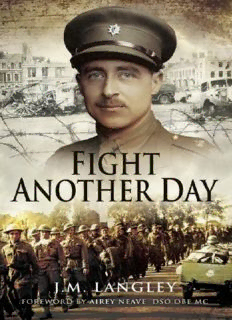
Fight another day PDF
Preview Fight another day
First published in Great Britain in 1974 by William Collins Sons & Co Ltd Reprinted in this format in 2013 by PEN & SWORD MILITARY An imprint of Pen & Sword Books Ltd 47 Church Street Barnsley South Yorkshire S70 2AS Copyright © J.M. Langley, 1974, 2013 9781783469536 The right of J.M. Langley to be identified as Author of this work has been asserted by him in accordance with the Copyright, Designs and Patents Act 1988. A CIP catalogue record for this book is available from the British Library All rights reserved. No part of this book may be reproduced or transmitted in any form or by any means, electronic or mechanical including photocopying, recording or by any information storage and retrieval system, without permission from the Publisher in writing. Typeset in Sabon by Phoenix Typesetting, Auldgirth, Dumfriesshire Printed and bound in England By CPI Group (UK) Ltd, Croydon, CR0 4YY Pen & Sword Books Ltd incorporates the Imprints of Pen & Sword Aviation, Pen & Sword Family History, Pen & Sword Maritime, Pen & Sword Military, Pen & Sword Discovery, Pen & Sword Politics, Pen & Sword Archaeology, Pen Pen & Sword Discovery, Pen & Sword Politics, Pen & Sword Archaeology, Pen & Sword Atlas, Wharncliffe Local History, Wharncliffe True Crime, Wharncliffe Transport, Pen & Sword Select, Pen & Sword Military Classics, Leo Cooper, The Praetorian Press, Claymore Press, Remember When, Seaforth Publishing and Frontline Publishing For a complete list of Pen & Sword titles please contact PEN & SWORD BOOKS LIMITED 47 Church Street, Barnsley, South Yorkshire, S70 2AS, England E-mail: [email protected] Website: www.pen-and-sword.co.uk This book is dedicated to my five children in the hope that they will never have to fight another day Author’s Note: Although all the events described in this book are true I have in certain cases changed the names of some of the people involved. Table of Contents Title Page Copyright Page Dedication Author’s Note: Introduction I. HE WHO FIGHTS 1 - Build Up for Battle 2 - Up Guards and at Them 3 - Destination Dunkirk II. AND RUNS AWAY 4 - In the Bag 5 - Home James ... 6 - Mission in Marseilles 7 - The Last Lap III. LIVES TO FIGHT 8 - The Resurrection of IV Z 9 - Bricks Without Straw 10 - Patrick Albert O‘Leary 11 - A Comet from Brussels 12 - The Navy Joins In 13 - Blows and Counter-Blows IV. ANOTHER DAY 14 - Return Journey 15 - One More River to Cross 16 - The End of the Day Introduction by Airey Neave, DSO, MC, MP During the Second World War the organization of secret escape routes broke fresh ground in military intelligence, and Jimmy Langley, the author, was one of the first in the field. His half-humorous style, ignoring his own sacrifice, epitomizes the spirit of those days. Despite the loss of his arm in France in 1940, he not only escaped from France but for the rest of the war was concerned in helping others to safety. We are now able, 30 years afterwards, to judge the contribution to the Allied victory of all those who worked to get back to fight another day. As this book illustrates, the highest tribute must be to those who constantly risked their lives in German-occupied territory. Thanks to them, over 3000 Allied airmen and several hundred soldiers evaded capture. The balance of sacrifice was tragic. We know that 500 men and women were executed or died in concentration camps. A far greater number succumbed to their ill-treatment after Europe was liberated from the Nazis. It may well be, as Jimmy Langley suggests, that for every man who got back a Belgian, Dutch or French patriot died. This is something we, who did not endure occupation, must never forget. It is part of the history of this century that from the first dark hours of German invasion there were always men and women from ordinary homes ready to hide helpless British soldiers. They showed a sense of human values that we badly need today. Those who are still alive seek no publicity. Their memorial lies in the great achievements of the underground escape movement in saving lives. They acted in the name of charity and freedom. Unlike the men they rescued, who were protected by the Geneva Convention on prisoners of war, they were civilians exposed to brutal treatment by the Nazi counter-espionage Services. These brave people came from every side. Communists and priests combined in what they believed to be a great human cause. It inspired doctors, nurses, artists and poets, but the majority came from simple cafés and farms in every corner of North-West Europe. They wished to play their part, however humble,
Description: